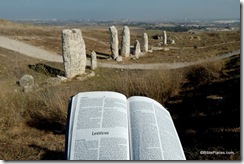Several people have asked me in recent months to share my thoughts on studying Scripture. I don’t think I have anything unique to share on the subject, but sometimes hearing it again or from one you know can give a fresh push. In that light, I offer a few thoughts.
The most important thing for studying the Bible is time. You can’t really study the Bible in ten minute chunks. Well, I don’t think you can. I’d recommend blocking off an hour. The first hour of the morning may not be the best for you, nor the last hour of the day. Maybe 8-9 in the evening. The obvious key here is making this a priority.
One way to help make it a priority is to get accountability, such as teaching what you ‘re learning to others. If you can’t find a willing group of third-graders, you can start a blog. If, however, you know that no one is reading, you may not feel very accountable.
The next thing is to choose a portion of Scripture that you are interested in. I recommend that you choose a portion that has limits set by the author. The easiest way to accomplish this is to study a whole book. If you chose to study Matthew 13, for instance, there’s a good chance you will come up with all kinds of crazy interpretations if you don’t understand the rest of the book.
Third, Bible study requires a pencil, pen, or keyboard. There are all kinds of ways to go with this, but if you ‘re not writing, you ‘re probably not studying. A couple of ideas that you might try if you ‘re using a computer: (1) copy your text from a Bible program, format it in a way that suits your method, and print it. This gives you the freedom to mark and highlight without ruining your Bible. (2) copy and paste verses by theme. I did this recently in studying Isaiah 1-12 and it helped me to quickly see threads running through the whole chapter. The point simply is that with a computer, you have lots of options that were not possible when working with printed text.
Fourth, read your entire text over many times. If you ‘re studying Galatians, read the whole book every day for a month. If you ‘re studying Luke, you might read six chapters a day, and that will get you through the whole book 15 times in 2 months. I believe this is a very important step in the process. You understand the whole from the parts and the parts from the whole.
Fifth, write your own commentary. Read each verse and write observations as well as questions. Writing down questions is just as important as listing observations. Questions push you further. Sometimes you ‘ll find the answer to your question as you study. Even if you don’t, questions help you to engage with the text. This step is the heart of the process; don’t shortchange or rush it. The most important thing is not what you write on the page but the understanding that you gain as you write on the page.
Sixth, read another commentary or two. You probably don’t want to do this each day, but if you ‘re studying Joshua, you might take this step after you’ve written your own commentary for every few chapters. You may want to purchase a couple of the best commentaries for your book. If you ‘re studying the book over a series of months, it is probably impractical to check it out of a library for that long. If you purchase the commentary, you can make notes in it.
How do you know what the best commentaries are? Ask a trusted pastor or teacher. Check out the rankings at www.bestcommentaries.com. There are assorted lists online, but the key is knowing whether the ranker has the same criteria in mind that you do. For my perceived audience (college grads with at least a minor in Bible), I’d make some generalizations. Helpful series, in increasing depth: Tyndale, New American Commentary, and NICOT/NICNT. Series to avoid for this type of work: Anchor, Hermeneia, Word Biblical Commentary. There are many individual volumes that are good and bad that are not part of any series.
Seventh, summarize the book. Start by summarizing paragraphs. Then summarize each chapter. Finally summarize the book as a whole, with the goal of providing a brief version of what the author hoped that his audience would understand. This is a very useful exercise in helping you to hone in on the essence of the book.
A subject that really deserves another post is the order in which you study the Bible. I’m a strong believer in reading books, including the Bible, in order. Earlier material prepares you for later material. Zechariah is best studied in light of Isaiah. Jeremiah must be studied after Deuteronomy. Matthew assumes a knowledge of the prophets. Keep this in mind as you choose books to study.
I ‘ll end with a word about application. Some view Bible study that doesn’t have an immediate daily application as incomplete. I disagree. I view Bible study as an opportunity to understand what the author/Author was trying to communicate. In understanding his message, my thinking is changed. With changed thinking, I live differently. So I’m not primarily concerned that I have a list of five things to do differently from each chapter. Of course, it also varies based upon the book you ‘re studying. Proverbs will have more applications than Leviticus.
What did I miss? Feel free to comment below. This is just off the top of my head and I certainly don’t consider myself any kind of expert. My goal is to motivate especially those who are out of school and who do not have a regular habit of studying the Bible.
